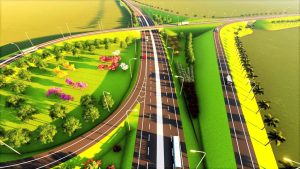
#OutToLunch: Let the demographic dividend not pass us by
By Denis Jjuuko The results of the national population census that were not overly surprising. Uganda is one of the countries with the fastest growing populations and we did not disappoint with 11.3 million added since the last census in 2014. We are now 45.9 million people. Phew! We are what some of my friends call “team no sleep” since we spend a great amount of our time producing babies. It is assumed babies are made at night when people frolic between the sheets instead of sleeping but that may not be the best way to start this article. We are a damn serious lot here! Anyway, one of the most interesting bits from the population census was the revelation that 55.6% of Uganda’s population is between ages 14 to 64. That translates to more than 25.5 million people. This is the age group that is defined as the working age. If harnessed appropriately, this demographic dividend that we have attained can lead to unprecedented economic growth. A demographic dividend leads to less resources spent on the elderly, those in retirement and even children. Those working should be able to take care of themselves and their offspring. Of course, this would require reduction in births so that investments are not put at entirely looking after children. However, it will take a while for us as a country to stop being “team no sleep.” Many people love to have several children or grandchildren. Sometimes it is because we are still an uneducated lot who believe that having more children is an insurance that protects a parent in case some of the children die. Since many children grow up by chance in Uganda, many parents would prefer to have more. If two or so die, they would not be childless, the argument goes. This means that Uganda would have to spend more money on education and health so that many people start seeing their children growing up and debunk their argument for having more kids. The more educated people are, the better chances of raising healthy kids. They will immunize them, make them sleep in mosquito nets, take them to healthy facilities when sick, and feed them better and most importantly educate them which eventually will break a cycle of poverty that most households find them in today. Also, like studies have shown, the more educated people are, the more likely to earn better. Investments in education are key in enabling people to earn better and live better lives. Many African countries have rolled out universal primary and even secondary education but the quality is low with many learners unable to read and write at the level commensurate with their level of education. Secondary education must be emphasized but also made relevant in this age of technology because this is the highest level many students in Africa attain. Digital and communication skills will be critical but also, they should leave secondary education such as O-level when they are able to do some work that can lead to sustainable employment. Integrating technical and vocational skills is important. If we massively invest in affordable high-quality education at all levels, investments will flow as businesses take advantage of our demographic dividend — a young highly trainable population. Most businesses such as factories rely on a workforce that is trainable to do repetitive work efficiently. They don’t even need to think, they need to simply add a part here and there on the assembly line or do the same thing repeatedly. Of course, there are many things that need to be in place to attract investments. Economic and political stability is crucial. And if we can’t find jobs for these 25.5 million people, there will not be political stability regardless of how many teargas canisters or pink water canons we import. If the tax revenue collection guys decide on whim how much one is to pay, it won’t make it easier for people to bring their money here either. If farmers in Masaka have to sleep in their gardens at night to protect their coffee from thieves, big coffee players will think twice before setting up their factories here. If a kick in Kampala sends you to your creator and the criminal knows police won’t find him, then people will take their money elsewhere. If Kampala remains run down as it is now, investors won’t be impressed to invest. Infrastructure is key. We can’t continuously avoid investments in the major road network in Kampala. Electricity must be available and affordable. Systems to facilitate businesses must be in place which means bureaucracy in government offices must be cut down. Civil servants should not behave as if they are doing investors local and foreign a favour. Otherwise, this demographic dividend may pass us by. The writer is a communication and visibility consultant. djjuuko@gmail.com

